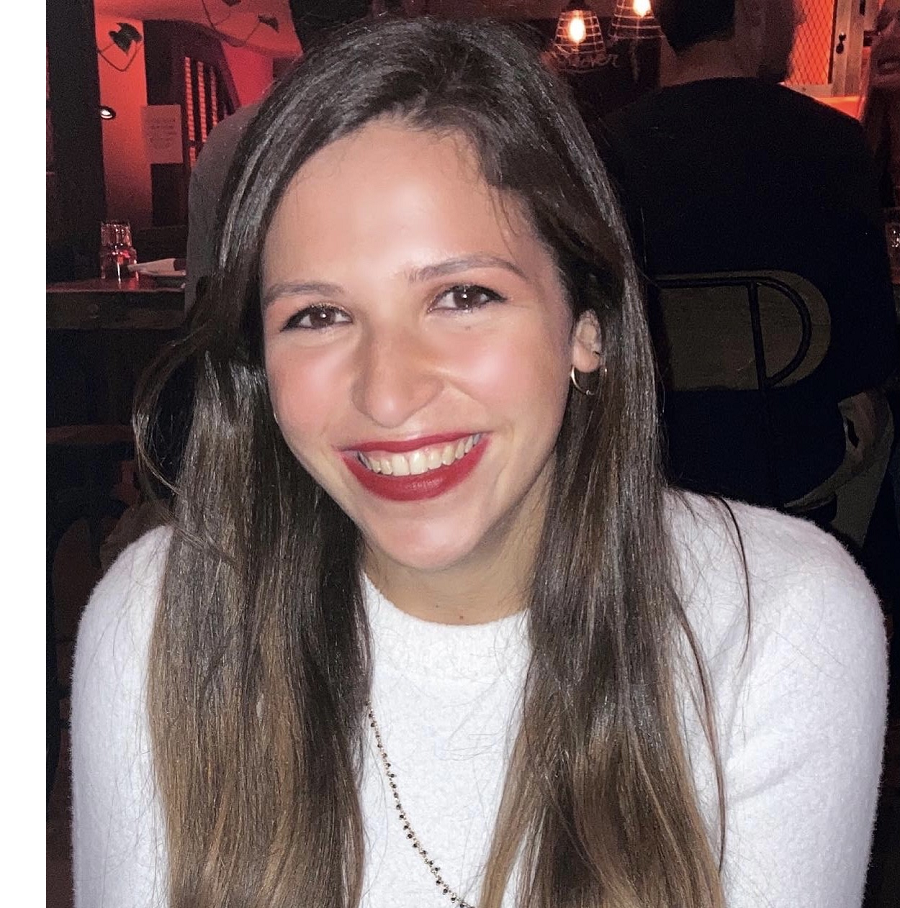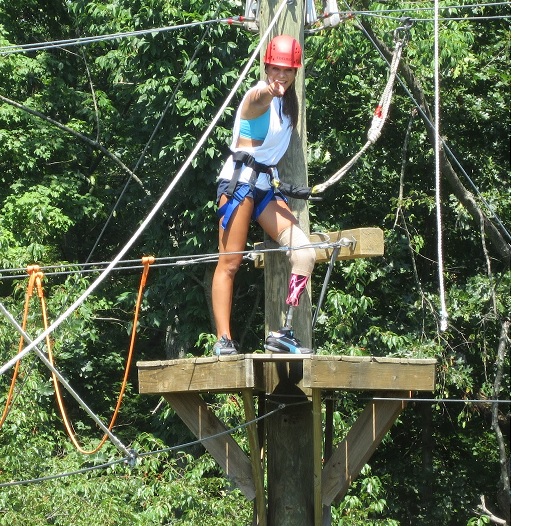by Alexandra Capellini

A few summers ago, during my annual stint as a counselor at the Amputee Coalition’s Youth Camp, one of my campers pulled me aside and confided that it made her very nervous to go swimming. She was a new above-knee amputee, just a few months in remission from cancer, and she didn’t like showing her scar in public. I completely understood—I used to have the same worries at her age, during my own recovery from childhood cancer and limb loss. I told my camper I saw resilience in her scar, and I said she could choose to enjoy the pool as much as anyone else around her.
My words lowered her anxiety a bit, but something else mattered more: seeing me take my prosthesis off and reveal my own scar in public. We both used our crutches and headed to the pool together. She was still hesitant, but we kept moving closer to the water, step by step, until we were in. I don’t remember anything after that except laughing and splashing in the water.
If I have learned anything from my campers about adapting to limb loss, it’s this: Young amputees don’t simply want to hear about how to cope and carry themselves with confidence. They want to see it. They need to see you live it.
I have been a counselor at the Amputee Coalition Youth Camp for the past several years. Nearly 150 children and teens with limb loss/limb difference gather from around the country for one week every summer, enjoying a traditional camp experience. It’s not just the campers who are amputees—the counselors are all amputees, too. We call ourselves The Amp Camp Fam, because we have built such close bonds while having so much fun being together.
During my first few years as a counselor, I was assigned to the 10- to 12-year-old girls. In many ways, they reminded me of myself as a first-time camper. Most of the younger girls in my cabin had never been to camp before. Some had traveled on their first plane rides away from small towns they called home.
As a counselor, I was responsible for making sure the girls had fun all week. I was there to support them in all kinds of situations, from the pool to the rock-climbing wall, the dance floor, the ropes course, and even performance skits on stage. At night, back in the cabin, I would often lead open-ended chats where the girls could share how they felt about anything on their minds. Very often, these conversations revolved around the unique challenges of living as an amputee.

Amputee Coalition Youth Camp
But by the next day, the campers were facing those challenges and rising to them. One of the scariest tests was the ropes course, which I always considered one of the most thrilling parts of camp when I attended as a kid. Even now, as a counselor, I have to give myself small pep talks before I climb up, because the height brings on such an adrenaline rush. It’s a daunting prospect for an able-bodied adult, let alone a child with limb difference.
I can recall one of my campers staring up at the course, watching other girls make their way through the obstacles in the sky, and the fear in her eyes was apparent. This girl was still struggling to bear full weight on her prosthesis, and I had talked with her often about how it takes time to trust our prosthesis, to truly feel safe and comfortable walking around on it. But it was at the ropes course where that lesson about trust really hit home. I challenged this girl to follow my lead up the stairs and be my partner for one element of the course: walking the upper-level tightrope. She followed me up, took her first cautious steps on the tightrope, gradually bore all her weight on her prosthesis, and moved ahead, one step at a time, until she reached the end of the course.
As camp counselors, we know every move we make is watched and absorbed by the campers. What we do and how we carry ourselves makes a big impression. The girls would watch how I got my own shoes on in the morning, and they would try the same thing when they struggled getting shoes onto their own prosthetic feet. If I ever needed to retrieve something from across the room at night, after I had taken my leg off, they campers would see me put my leg back on and get what I needed on my own—and when they found themselves in the same situation, they would put their legs back on too, reinforcing their sense of independence.
Camp helped the girls learn how to take charge of their own needs, wants and goals. That’s a skill we all work on throughout our lives, even as adults. Working as a camp counselor has made me more aware of how I carry myself. Speaking out loud, I accept my body, I love my body, and I trust my ability to physically adapt to most situations. I also check myself: Am I living up to those words, showing the girls what it means to practice what we believe? More than anything, I want my campers to know that the first step is believing in what you can do, and the next step is . . . the step itself. I want my girls to take pride in their scars and limb differences; I also want that pride to motivate them to actually go into the pool or up the rock wall. I want my girls to trust their prostheses to carry their weight safely; I also want that trust to help them really push outside their comfort zone with prosthetics. I want my girls to feel comfortable asking for help and advocating for themselves; I also want them to make adaptations that allow them to live as independently as they can.
When each camp session ends, I am always proud of the progress we’ve made. And I always look forward to the next summer, when the Amp Camp Fam reunites, welcomes new members, and takes on new challenges. Being part of that journey is the highlight of my year—and what a joy it is!
Alexandra Capellini is a 25-year-old above-knee amputee living in New York City. She is a medical student, a Certified Peer Visitor for amputees, and a counselor at the Amputee Coalition Youth Camp. Follow her on Twitter @acapellini1995, and read more of her writing about life with limb loss at nytimes.com.



